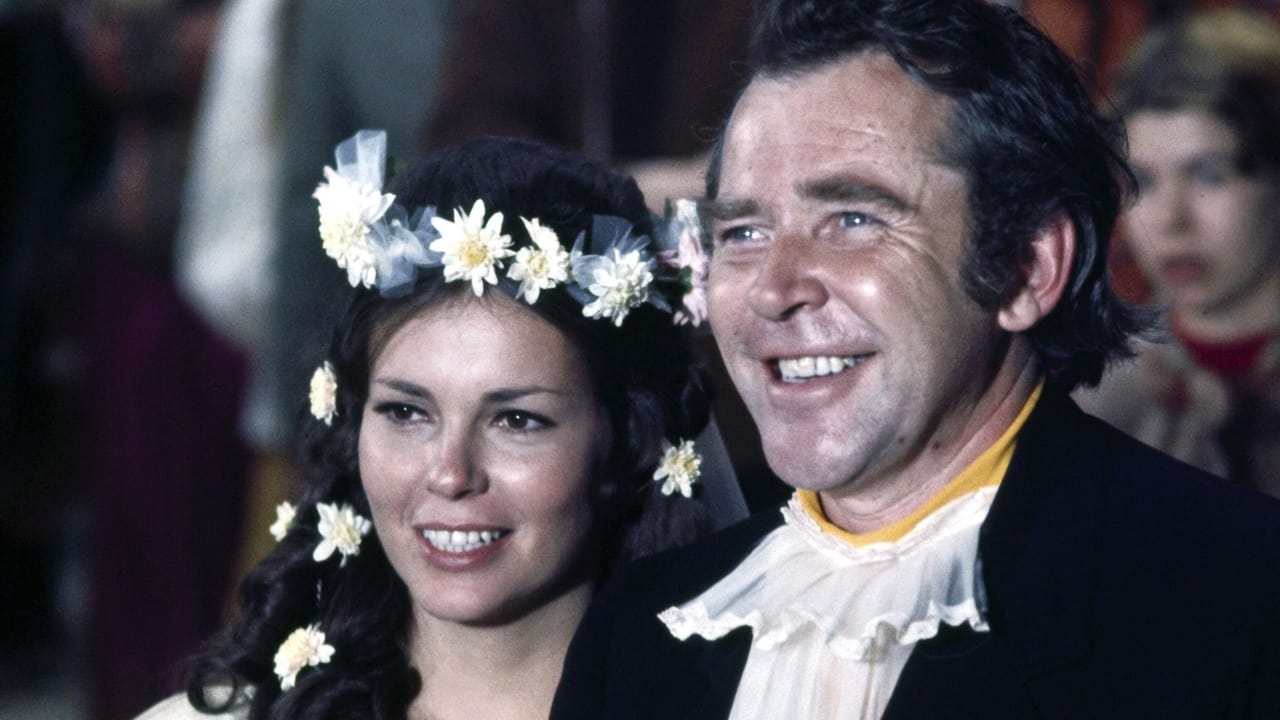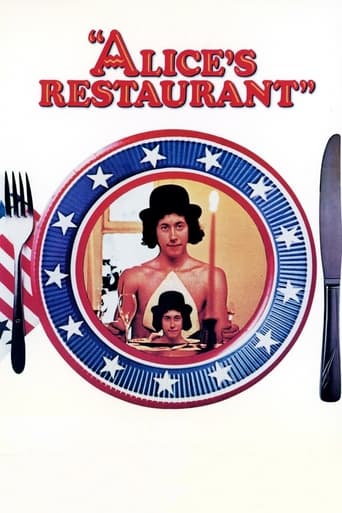

It's 1965 and Arlo Guthrie has the World's longest hair. Longer then any Beatle, longer then all the Beach Boys put together, maybe even longer then Sky Saxon. This is said in jest of course because Arlo really did have long hair in 1965, it just wasn't this long. Back to that in just a bit. Oh yes I love this movie, and what about those Jefferson Airplane posters from '66, right there in '65? I saw this in the theater in 1969 and really enjoyed it. Watching it now and enjoying it. I've so much admiration for the true artists and rebels and drop out of the Sixties and this is really an ode to them, as well as the pathfinder Woody, Arlo's father. The movie is funny/sad and in a "this land is your land" kind of way, very patriotic as well. Arlo is a natural, real and unaffected. Now back to the HAIR. Hey it's a movie and it doesn't have to be period piece or even hair piece. People have worn short hair wigs in movies before. But I should not judge just because Arlo didn't. The hair thing is something I've noticed in a lot of Seventies TV & movies. Actors would just refuse to cut their hair so there they would be in 1930s or 40s situations with big sideburns, or such. For laughs watch MASH. Yes it's comedy, but it's the military in the mid Fifties and they have got some waaaay gone Seventies sprouts a growin'. But the Seventies were different. Long hair was safer, fashionable. In the Sixties it was for rebels and rare and true artists like Arlo Guthrie.
... View MoreArthur Penn seems to portray the hippie culture in a very honest light. He doesn't directly appeal to the opinion of mainstream America, or the establishment "square" opinion of the counterculture, but rather appeals to the counterculture itself in the form of a cautionary tale. In Alice's Restaurant, he does not poke fun at and satirize the hippie culture like in I Love You, Alice B. Toklas!, nor does he dramatize it and glorify it like in Easy Rider. Instead, the hippie culture is portrayed in a series of events much like real life experiences of real hippies. At first, the youth gravitated towards the hippie culture and the commune system for its freedom, sexuality, and drug-use. However, as time wore on, the commune ideal began to crumble like many other communist societies do- hippies begin to realize they are leeches on society, and in their valiant efforts to 'stick it to the man,' they incidentally remain reliant on the establishment to live. Alice's restaurant portrays the joys of commune life. In two particular scenes- the Thanksgiving dinner and the final marriage ceremony- life as a hippie is free, careless, and exciting. Everyone is happy and relaxed, there are no problems, and they can freeload all they want. This appealed to many people in the counterculture, and the film even reinforced these sentiments. However, it also appealed to the establishment's ideals. In one scene, Arlo is thrown out of the window of a restaurant for having long hair, as long hair is the stigma of the counterculture movement. This reflects some of the violence of the establishment against the hippies, and demonstrates the daily struggles of being a member of the counterculture. This may have portrayed the establishment as evil and hateful, however by the end of the film, the opinion of the establishment is subtly expressed.As the film progresses, the audience begins to realize the pitfalls of the commune system. One member of the commune falls victim to drug addiction, and overdoses on heroin. His death shows a dark side of the counterculture that is rarely expressed- drugs can be a gritty and terrible thing, and with freedom comes much responsibility to keep such addictions at bay. Free love and drug use may be fun and care-free for awhile, but drug overdose and the epidemic of STDs clearly show that there are consequences for such a lifestyle. Also, on a much more subtle level, in the last shot of the film we see Alice longingly staring at the camera after Arlo has just left the commune. This takes place just after the marriage ceremony, which was the last effort of Alice's husband, Ray, to reinforce the commune ideal. As Ray romantically expresses his ideas of somehow opening another commune, Alice begins to realize the ultimate flaw of the counterculture, and despairingly awaits what will be come a terrible, fruitless marriage. Opening more communes certainly will not fix the problems of the current one- yet it is a common idea expressed by many communistic societies on the brink of destruction. If just one more- one more- commune were to be built, everything would be fine. Every commune begins well, but all suffer the same fate. Ultimately the members of the counterculture are freeloaders on the establishment society, and cannot survive once all resources have been used up in one place. Another commune in a different location may solve the problem momentarily, but unless the commune lives off the land and becomes self-sustaining, it will always fail. This is the limitation of the hippie culture, and this is exactly why such an alternative lifestyle is no longer widely existent today in America. It burnt itself out- and Arthur Penn offers this forlorn prediction in that final shot. Everything has fallen apart, Arlo has given up the commune life for the time being, and Ray is desperately grasping at straws to keep it together and stay sane and happy. Even though Alice has a Restaurant, and a way to make money, ultimately the very hippies they surround themselves with in the commune will suck it dry and move on. In Alice's Restaurant, the counterculture is revealed for what it truly is- fun, refreshing, and irresponsible. The "squares" may not have any fun, but they get things done. Ultimately, the establishment, with all its lousy rules and regulations, stigmas and dogmas, was right- and Penn did an excellent job of gently telling this to the counterculture. The hippie youth went to see the film and surely enjoyed it, but most likely left the theatre with a slight unease and a nagging sense of dread.
... View MoreArlo Guthrie's hilariously mordant 20 minute story song gets adopted into an affably whimsical, episodic, occasionally funny and ultimately quite downbeat and sobering free-form feature by director Arthur Penn that astutely captures the key issues and concerns of the 60's hippie counterculture: dodging the draft, smoking grass, getting hassled by the pigs, being persecuted by grossly intolerant, narrow-minded, repressive straight conformist squares, trekking all over the country to find your true self, and defying everyday social conventions so you can do your own thing, man. The rambling, just barely there plot centers on the winningly droll, breezy and irreverent Guthrie's pilgrimage through the counterculture, a bizarre, eventful, eye-opening journey of self-discovery that reaches its peak when Arlo gets arrested for illegally dumping trash, thus making Arlo ineligible for wartime service in the army due to his disreputable status as an unrehabilitated criminal (the scenes at the army center are riotous, with M. Emmet Walsh in a gut-busting early role as the gruff Group W sergeant whose staccato motormouth way of talking renders everything he says incomprehensible).Police chief William Obanheim appears as himself and proves to be a hugely likable good sport by allowing himself to be the endearingly humbled recipient of a few right-on japes made about uptight authority figures. "Glen and Randa" 's Shelley Plimpton has a nice cameo as a cute groupie who hits on Arlo at a party. The film's precise, clear-eyed portrait of the painfully gradual disintegration of flower power idealism and the cynicism and disillusionment that followed in its wake nowadays seems all too grimly true and prescient, with the volatile relationship between vulgar, boorish, obnoxious swinger James Broderick and his frustrated, irritated wife Pat Quinn (they play Ray and Alice Brock, the owners of the titular restaurant) brilliantly reflecting the turbulence and capriciousness of the period. Somewhat erratic and uneven, with a shaky tone that uneasily shifts between comedy and drama, this quirky, laid-back, naturalistic historical curiosity piece provides a lyrical and poignant time capsule of the 60's that for all its admitted imperfections nonetheless remains haunting and effective.
... View MoreAlice's Restaurant is a time capsule of the attitudes of young people during the late '60s as experienced by folk singer Arlo Guthrie and his friends like the married couple Ray and Alice Brock, played here by James Broderick (Mathew Broderick's father) and Pat Quinn. Very much of its time, Arthur Penn's film tries to mix the humorous with the dramatic with uneven results. Some of the most touching scenes are those of Arlo with his father, folk singer Woody Guthrie (played here by Joseph Boley) and those of Ray and Alice after the drug death of a friend. There's also a nice musical duet with Woody's friend Pete Seeger and Arlo in Woody's hospital room. The most funny scene was the one concerning Arlo's attempts to get more urine for the draft board. Look for Shelley Plimpton, who had married Keith Carradine and gave him a daughter, actress Martha Plimpton, as Reenie who is a 15-year old girl who tries to seduce Arlo and M. Emmett Walsh as a Group W sergeant. Though nominated for Best Picture of 1969, Alice's Restaurant seems dated now. Ray and Alice's remarriage at the end and the followup makes this one of the most bittersweet movies I've ever seen...
... View More